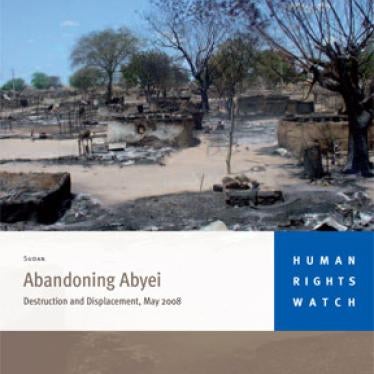(New York) - The Government of Southern Sudan should take urgent steps to uphold human rights, including protecting civilians from armed communal violence and excessive use of force by soldiers and security forces, Human Rights Watch said in a report released today. At the same time, the Government of National Unity, comprising the northern National Congress Party and the southern Sudanese People's Liberation Movement (SPLM), should implement without delay the human rights provisions of the 2005 Comprehensive Peace Agreement that ended the 21-year civil war.
The 44-page report, "There is No Protection: Insecurity and Human Rights in Southern Sudan," documents the most pressing human rights challenges facing the SPLM-led Government of Southern Sudan. The problems include an inability to protect civilians effectively from armed attacks and violence, a failure to address abuses by security forces, and a weak justice system. The report also outlines national legal reforms urgently needed to permit free and fair elections, currently scheduled for mid 2009.
"The Government of Southern Sudan should hold soldiers and police accountable for crimes against civilians and address systemic abuses in the justice system," said Georgette Gagnon, Africa director at Human Rights Watch. "The Government of National Unity needs to make human rights a top priority as it prepares for elections, by revising repressive national security and press laws and establishing a national human rights commission."
These reforms are more urgent than ever in view of critical steps yet to be taken, required under the peace agreement before elections can be held. These include announcing results of the April 2008 national census, demarcating the North-South border, and carrying out basic election preparations. The status of the contested oil-rich area of Abyei, which resulted in major clashes and civilian displacement in 2008, still needs to be resolved. Each of these steps could be a potential flashpoint for new violence.
While the Government of Southern Sudan, created under the 2005 peace agreement, has made significant progress in state-building and reconstruction in a society ravaged by a long civil war, it has not been able to protect civilians from violence, including by its own security forces.
In 2008, Human Rights Watch found that soldiers from the Sudan People's Liberation Army assigned to carry out policing functions were responsible for serious human rights abuses. For example, in Rumbek in September, soldiers shot at least eight civilians during a disarmament operation. Witnesses reported that some soldiers were drunk and fired weapons at unarmed civilians.
In June, soldiers killed 10 civilians in two separate clashes with civilians in Eastern Equatoria during a law enforcement operation. Witnesses told Human Rights Watch that the soldiers killed three men at close range during one of the clashes and killed two unarmed civilians following the clashes.
"All too often, soldiers who are untrained and ill-disciplined abuse civilians instead of protecting them," said Gagnon. "The Government of Southern Sudan should put in place a strategy for using the army that puts human rights at its center."
The report also documents crimes by southern security forces against civilians, including beatings, robbery, intimidation, land-grabbing, and sexual violence, and says that soldiers and former soldiers often view themselves as "liberators" of the South and above the law. Such cases are rarely prosecuted, even when government bodies investigate human rights violations by soldiers.
"The Government of Southern Sudan should show it is serious about establishing the rule of law and investigate and prosecute all soldiers and security forces for crimes against civilians," said Gagnon.
In addition, the report describes a weak and nascent justice system in the South that has high levels of arbitrary arrests and detentions, prolonged pretrial detention, and very poor conditions in detention facilities. Human Rights Watch called on the Government of Southern Sudan to ensure that all detentions are legal and to establish regular inspections of all places of detention.
Other recommendations to the Government of Southern Sudan and international donors include more training for police and soldiers in their legal roles and responsibilities, and greater support to the Southern Sudan Human Rights, Anti-Corruption, and Land Commissions.
Human Rights Watch urged the United Nations Mission in Sudan (UNMIS) to strengthen its capacity to protect civilians by more robustly interpreting its protection mandate. The UN mission should also increase human rights monitoring and public reporting, especially in disputed border areas that could experience new violence from increased national political tensions in the pre-election period.








